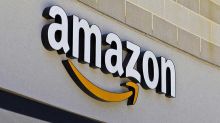AMZN Sep 2024 110.000 call
OPR - OPR Delayed price. Currency in USD
Add to watchlist
As of 12:26PM EDT. Market open.
Loading interactive chart…
- Investor's Business Daily
Target Unleashes Thousands Of Deals With Earnings Due As Walmart Makes Inroads
With Walmart making inroads, Target said it's cutting prices on 5,000 items. Earnings are due Wednesday.
- Investor's Business Daily
Magnificent Seven? Just Two Members Clear This Bar
Ultimately, earnings drive share prices. Only two Magnificent Seven stocks, and a third megacap, meet this triple-25% growth standard.
- Investor's Business Daily
Is Amazon Stock A Buy Amid Leadership Shakeup At Cloud Business?
Amazon stock has started strong out of the gate in 2024, What will new leadership at AWS mean for shares?


